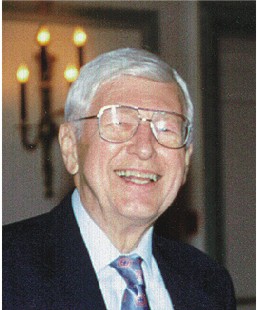

Richard B. (Dick) Schulz was born in Philadelphia. Dick earned the baccalaureate and masters degrees at the University of Pennsylvania, and worked on a doctorate. He was a research assistant at the University of Pennsylvania for four years. During that time he invented something on his own time, but the university claimed it. He left their employ on principle; he believed they were wrong. For Dick, money did not matter as much as virtue; and having the respect of his peers.
He then formed his own consulting company called Electro Search, working in the field of Electromagnetic Compatibility (EMC). He did quite a lot of work for the Federal Government. After some time, he sold his business and moved to Chicago where he worked for Armor Research Foundation for two years. Then in 1961, Boeing called him to Seattle to oversee the integrity of the electrical system in the first Boeing 747. Dick left Boeing and went to Southwest Research Institute in San Antonio, Texas, in 1970 where he worked in EMC research for about four years. He then went to the Electromagnetic Compatibility Analysis Center (ECAC) in Annapolis, Maryland, and worked there ten years. After leaving ECAC, he went to Xerox Corporation in Dallas, Texas, and worked there until the early 1990s. After retiring from Xerox, he worked part time for a small company in Dallas that had been started by a young man who had been at Xerox. He also stayed active in EMC standards work and writing and editing papers and books about EMC.
Dick served as editor of the IEEE Transactions on Electromagnetic Compatibility for 18 years. He wrote many papers and participated in the writing and editing of a number of books on EMC. He was a Life Fellow of the IEEE. He chaired the 1968 IEEE International Symposium on Electromagnetic Compatibility. He was also a former President of the EMC Society Board of Directors. He was considered one of the top EMC specialists in the world.
Dick loved to play bridge. He was an excellent player and was a Life Master. Other people liked to play bridge with him, not just because he was good, but because he did not take himself or the game too seriously. He liked to dance. He was an amateur radio operator. In 1940 he put together a TV set and invited neighbors to see the TV picture on the tiny CRT. Dick built a house by the ocean in the mid 1960s when he lived in Seattle. He was a man of many talents. He did the plumbing, wiring, paneling, and kitchen; all on weekends.
Dick was handicapped by multiple sclerosis, but he never let it keep him from accomplishing anything he wanted to do. He was a man of unwavering faith in God; but he did not talk it, he just lived it with integrity, faithfulness, kindness, patience, and peace.
By Ed Bronaugh
Memorial contributions may be made to the Multiple Sclerosis Society, 8750 N. Central Expressway, Dallas, Texas, 75231.
Editors Note: My colleague at Lindgren, Dale Svetanoff, as Chairman of the IEEE Working Group on P299, recalled his last committee meeting held in Denver in conjunction with the IEEE EMC Symposium. Dick Schulz attended this meeting. I’d like to share Dale’s recollection with you and thank Dale for providing this.
“Those of us who attended the Friday meeting in Denver will surely recall Dick Schulz’s presentation on a non-RF method of determining shielding performance of small enclosures by using DC (or low frequency AC) resistance measured across some portion of the enclosure. As stated at that meeting, Dick’s name can be found on the ORIGINAL 299, dating from 1969. His input on the history of 299, along with remarks from fellow ”originals" Ed Bronaugh and Jim Klouda, clarified many issues for us “newer” folks during technical deliberations of the previous Working Group. Dick was Chairman of the IEEE Working Group on P299 until July 1995. He was most helpful to me in those early days of my chairmanship, for I had lots of reading and understanding to do in order to better comprehend the task at hand. Dick was both an excellent engineer and a gentleman. The EMC world will miss Dick Schulz."